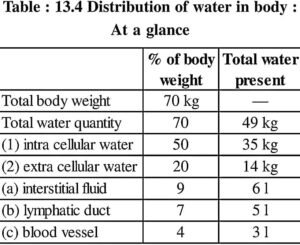Water | Definition, Sources and Functions of Water
Water —
- Water is very important for life. After oxygen, water is an essential requirement for survival of life. Water is formed by the chemical combination of hydrogen and oxygen. The chemical formula of water is H2 0. It is an inorganic compound.
- Physical organization— Water makes up 60- 70% part of our body’s weight. Quantity of water is 60-70% in tissues. Bones and teeth also have about 20% of water.

Water is present in all the cells of body but the percentage of water differs in different organs. Water distribution in the body can be divided into 3 categories:
- Extra cellular fluid— this includes 20% of water.
- Intra cellular fluid — this includes 50% of water.
- Imterstitial fluid— this includes 9% water, 7% water is present in lymphatic ducts and 4% in blood vessels.
70-75% water is present in the body of children. Slightly built people have more quantity of water in their bodies than people with heavely built bodies. Bodies of men have more water than that of women. With the increasing age water in the body decreases while fat gets stored.
Organs like liver, brain, stomach, small intestines which perform more active functions such as digestion, absorption, and metabolism have more water quantity than other tissues. In contrast, bones and teeth which are inactive for metabolism functions have less quantity of water (20%).
Functions of water —
- Asasolvent— Water is an important solvent. All the nutrients in the body are carried by water to different cells. Water is essential for digestion. It also helps in absorption of food and metabolism.
- For controlling body temperature— Water has specific heat. This is the reason why water is capable of maintaining a constant body temperature. Water distributes the body’s entire internal heat to all the parts of body. When the body temperature increases water removes excess of heat as sweat which keeps the temperature constant.
- As a lubricant— Water acts as a lubricant in internal organs, joints, and between organs. It keeps the cells moist. Presence of saliva in mouth makes swallowing of food easy. Mucous is present in respiratory system, digestive system, excretion system, etc, presence of water between joints reduces friction. Lack of water in joints at old age causes joint pain.
- As a structural unit of body cell— Cell is the smallest unit of body. Water plays an important role in formation of new cells.
- For formative functions— Water is present in every cell, fiber, tissue of the body. But the amount of water is more in some fibers and less in others. Water is more in active organs where metabolic activities are rapid while less in others.
- Protection of soft organs— Water is present around all the soft organs of the body and protects them from external shocks. Presence of cerebrospinal fluid around the brain is one such example.
- Removal of waste products— It is necessary to remove the waste, harmful substances from our body or produce and accumalate poison in the body. Water removes these waste products with sweat, urine, etc, by dissolving them in itself.
- Transportation of nutritive substances— Water dissolves all the nutrients in itself. Dissolved nutrients get mixed with blood and reach different body organs through blood vessels and lymphatic ducts.
Sources of Water —
- body takes water from three main sources—
1.RAIN
2.SURFACE WATER
- -Impounding reservoirs
- -Rivers and streams
- -Tanks, ponds and lakes.
3.GROUND WATER
- -Wells
- -Springs.
Home Science Latest Post :- Click Here
Water Questions and Answers :-
Question 1. Which one is a process in which water changes into vapours in atmosphere?
(a) Evaporation
(b) transpiration
(c) Precipitation
(d) condensation
Click to show/hide
Question 2. Potable water is
(a) ocean water
(b) groundwater at selected places
(c) river water
(d) ponds water
Click to show/hide
Question 3. Which is not a part of water cycle?
(a) Cloud formation
(b) Rain
(c) Drinking by animals
(d) Sun
Click to show/hide
Question 4. Which is a result of condensation of water vapours?
(a) Rain
(b) Snowfall
(c) Hail
(d) Tiny water droplets
Click to show/hide
Question 5. Which one is the purest form of water?
(a) River water
(b) Groundwater
(c) Rainwater
(d) Ocean water
Ans. ⇒ ????
